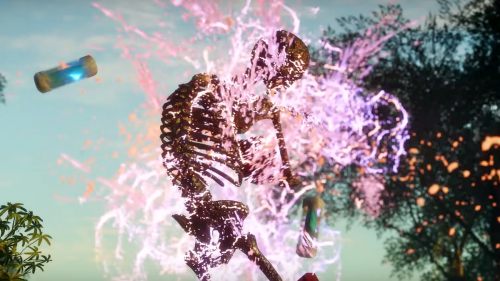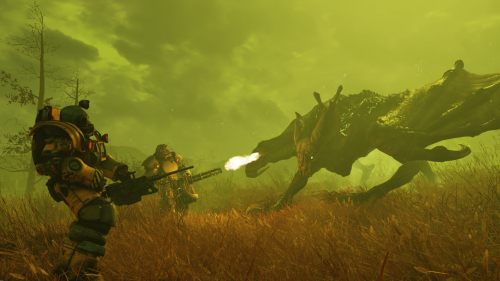The FALLOUT 76 Diaries, Part Two: A Tale Told By Nobody, To Nobody
Why do people play Fallout games? I can only speak to my own perspective: I play these games for their places to explore, characters to meet, and stories to play out. The action-oriented aspects are fine, but it’s all about the immersion and storytelling for me: pottering around in the post-apocalypse and seeing what you find and who you meet along the way. Bethesda has been terrific at delivering that experience, their games unfolding at a pace measured by the ability to take it all in. A single-player pace.
The studio knew this - so much so that Todd Howard made a point of reassuring his E3 audience that Fallout 76 could essentially be played solo. He also stressed that there wouldn’t be randos running about everywhere, with player counts capped at 24 per world. If you’re not specifically seeking out players to team up with, you can essentially play the whole thing by yourself. But does that actually work?
I’ll say this much: the presence of other human players aside, there’s never been a more “solo” Fallout game than Fallout 76. At first, everything seems pretty normal: you go through a character-creation process, make your way out of your Vault, and head into the brave new post-apocalyptic world. But after a little while, a sensation of emptiness creeps into the atmosphere. For a game where you can encounter literal human beings, Fallout 76 is lonely as hell, because of a baffling decision not to include a single substantial non-player character in this game. Lip service is paid to this in the game’s lore, but it’s patently a patch-up to justify a design decision. The emptiness of this world feels completely artificial; never before has a Bethesda game felt less alive.
Now, there’s a story reason for this: Vault 76 is canonically the first vault to open up, so the only former Vault-dwellers in the world are the real-life players of the game. But that doesn’t excuse the total lack of unique robots, Ghouls, or Super Mutants that might speak in more than combat barks, let alone give quests and engage in dialogue with the player. Every creature you’ll find in Fallout 76’s slice of West Virginia is functionally mute, either a monster, a robot, or a zombie (now available in indistinguishable Scorched and Ghoul varieties!), and with the exception of a few gussied-up vending machines, most are purely cannon fodder for what is, thanks to pervasive and ruinous performance issues, a frustratingly unresponsive shooter.
The truly galling thing about all this is that the overworld design is actually pretty solid’. There’s a lot to explore, a lot to see, and plenty of Bethesda’s trademark environmental narrative tableaus dotted around the map. Fallout 76’s West Virginia is gorgeous when the game’s running properly, and it’d be great fun to explore were it not for some of the more MMOish design elements. But nobody’s there to give any of it context, and that follows through to the narrative design as well.
Without NPCs, you pick up quests by listening to holotapes, looking at notes, or reading in-game computer screens. Mechanically speaking, there’s little difference between getting a quest from an NPC and getting it from a computer terminal, but emotionally, it makes all the difference in the world. Lacking a present character to centre them, quests immediately become more forgettable; they lose urgency and immediacy; suddenly, you’re looking at a checklist of bits of busywork, rather than a mission to help someone. Who cares about doing a quest for somebody who hasn’t taken a breath in decades? The whole game is lacking a sense of “why," save for a vaguely-defined and unenthralling goal of “rebuilding.”
What’s more, the storylines in Fallout 76 break one of the fundamental principles of storytelling, interactive or otherwise: by definition, they tend to take place in the past. Plenty of Fallout quests have centred on uncovering backstory before - Vault quests, in particular - but more often than not, they were driven by present-day urgency. Someone would be waiting on you to do the quest, whether it was one of the richly-written companion storylines or Preston Garvey telling you to go clear yet another randomly-selected settlement. Here, you pick up a note, and it gets added to an ever-lengthening list of map waypoints.
Again: these stories are often solid, with some terrific writing and voice acting. Unfortunately, the game’s always-on unpausability and constantly respawning enemies mean players will rarely get a chance to see any of it. And if you’re playing with others - the stated intended way to play the game - you’ll never read anything, because of an ever-present social pressure to keep moving (made worse by the irritating reality that nobody’s in-game to-do list is ever likely to look identical to their teammates’). I truly feel for the writers on this game.
Even the game’s basic structure works against its storytelling. You’re not pushing a story forward; you’re perpetually stuck in a state of temporal motionlessness. That’s not by accident; it’s a core part of how this kind of MMO works. You can’t create change in the world, because the game state has to remain consistent for all players. Thus, the only impact you can really make is in killing things, or building structures in your camp. The result is the first-ever open-world Fallout game without a narrative, and based on my understanding of the series’ values, that’s extremely un-Fallout.
So what is Fallout 76 about? As with most MMOs, it’s about pushing numbers ever upwards. That works in some games: while playing, I’ve been thinking a lot about Destiny, which is entirely based around repeatedly doing activities to get better loot. Somehow, that’s much more satisfying than the supposedly more story-rich Fallout 76. Perhaps it’s because Destiny’s core mechanics are fun, well-tuned, and designed from the ground up around multiplayer, that I’m an obsessive about that game and more-or-less done with Fallout 76. (And despite its early reputation for having no story, even Destiny has bolstered its NPCs and storylines in the past years, making them downright beloved to many players.)
There’s an argument to be made that Fallout 76’s storytelling is meant to be self-directed. Todd Howard’s E3 presentation suggested that NPCs would simply be replaced by human players. That’s nice in theory, and from my perspective, probably the most fun way to play the game - I might even do it myself, if I find some time. In reality, though, only a handful of people worldwide are committed enough to roleplaying to actually behave like an in-world character. Everyone else is just out to kill shit and loot shit. And possibly to kill and loot you.
Maybe there’s more interesting material in Fallout 76’s endgame. I probably won’t find out, though, because the game is so frontloaded with uninspiring content that I’m not even sure how long I’ll persist. Patches will arrive to lessen or eliminate the game’s bugs and performance issues, but there’s no patching out the core design ethos. Fallout 76 removes the best bits of the Fallout experience and replaces them with hours of mindlessly following quest markers and endlessly shooting enemies. It’s an experiment in combining a traditional Fallout experience with that of an MMO, and for me, those two experiences do not gel together at all.
Your mileage may vary, of course. I can see some players clicking with what Fallout 76 is doing, and with a more stable build, emergent multiplayer shenanigans are guaranteed to occur. Some occurred in my time playing with the BMD team, though many were centred around clowning the game's less-pleasant attributes. But I likely won’t be among those players. This is the first Bethesda game I’ve ever disliked - and that, more than any amount of virtual devastation, makes me sad.



